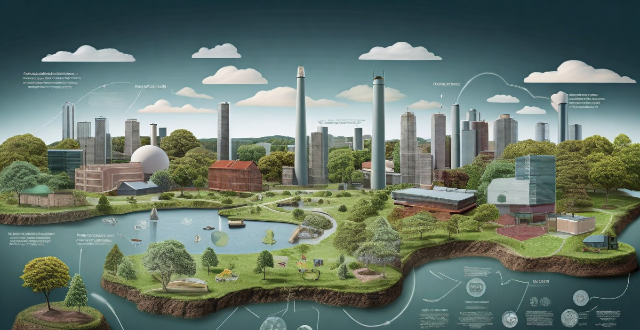Environmental degradation affects global ecosystems in various ways, including loss of biodiversity, disruption of ecosystem services, changes in the carbon cycle, and impact on human health. It is crucial to take steps to mitigate environmental degradation and protect our planet's ecosystems for future generations.

Environmental Degradation and Its Impact on Global Ecosystems
Environmental degradation refers to the deterioration of the earth's natural environment, including its land, water, air, and biodiversity. This degradation can have far-reaching effects on global ecosystems, which are interconnected networks of living and non-living components that interact with each other. In this response, we will explore how environmental degradation affects global ecosystems in various ways.
1. Loss of Biodiversity
Biodiversity is essential for maintaining the balance of ecosystems. However, environmental degradation often leads to a loss of biodiversity, which can have severe consequences for global ecosystems. Some of the ways in which environmental degradation affects biodiversity include:
* Habitat Loss: Human activities such as deforestation, urbanization, and agriculture often result in the destruction of natural habitats, leaving many species with limited or no suitable areas to live.
* Pollution: Pollution from various sources, including industrial waste, pesticides, and plastics, can contaminate soil and water, making it difficult for plants and animals to survive.
* Climate Change: Climate change caused by human activities has led to changes in temperature and precipitation patterns, which can affect the distribution and abundance of plant and animal species.
2. Disruption of Ecosystem Services
Ecosystem services are benefits that people obtain from ecosystems, such as clean air and water, pollination, and nutrient cycling. Environmental degradation can disrupt these services in several ways:
* Water Scarcity: Overuse of water resources for agriculture, industry, and domestic purposes can lead to water scarcity, affecting both humans and wildlife.
* Soil Erosion: Soil erosion caused by deforestation and overgrazing can reduce the fertility of soils, making it difficult for plants to grow and thrive.
* Air Pollution: Air pollution from burning fossil fuels and other sources can harm human health and reduce the productivity of crops and forests.
3. Changes in Carbon Cycle
The carbon cycle is a crucial process that regulates the amount of carbon dioxide in the atmosphere. Environmental degradation can disrupt this cycle in several ways:
* Deforestation: Trees absorb carbon dioxide from the atmosphere during photosynthesis. When trees are cut down or burned, they release carbon dioxide back into the atmosphere, contributing to global warming.
* Soil Erosion: Soil acts as a carbon sink by storing organic matter. When soil is eroded or degraded, it releases carbon dioxide into the atmosphere.
* Ocean Acidification: Oceans play a vital role in the carbon cycle by absorbing carbon dioxide from the atmosphere. However, increased levels of carbon dioxide in the atmosphere have led to ocean acidification, which can harm marine life and disrupt the carbon cycle.
4. Impact on Human Health
Finally, environmental degradation can also have significant impacts on human health. Some of these impacts include:
* Respiratory Diseases: Air pollution can cause respiratory diseases such as asthma and lung cancer.
* Waterborne Diseases: Water pollution can lead to waterborne diseases such as cholera and dysentery.
* Food Security: Environmental degradation can affect food security by reducing crop yields and fish stocks, leading to malnutrition and hunger.
In conclusion, environmental degradation affects global ecosystems in numerous ways, ranging from loss of biodiversity to disruption of ecosystem services and changes in the carbon cycle. These impacts not only harm the environment but also have significant implications for human health and well-being. Therefore, it is crucial to take steps to mitigate environmental degradation and protect our planet's ecosystems for future generations.